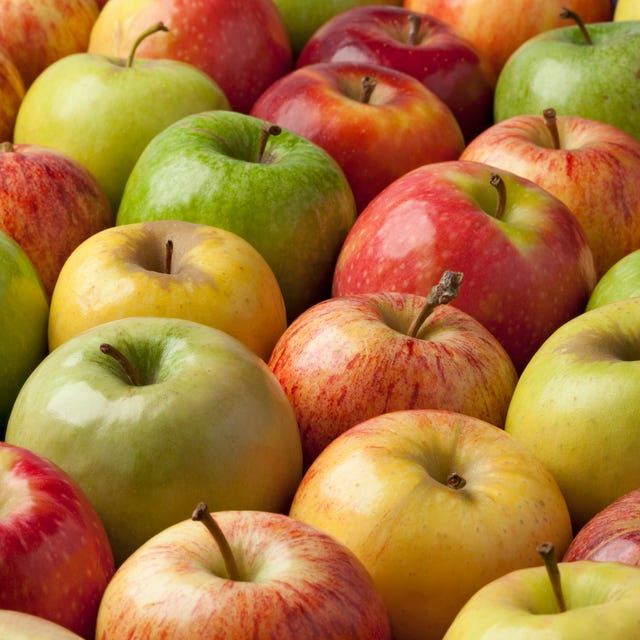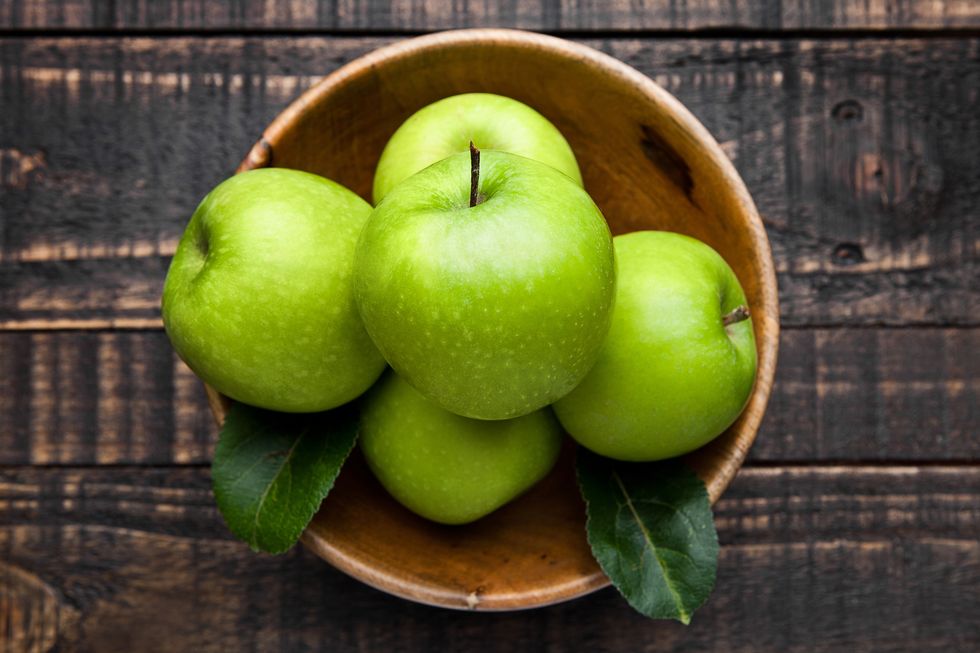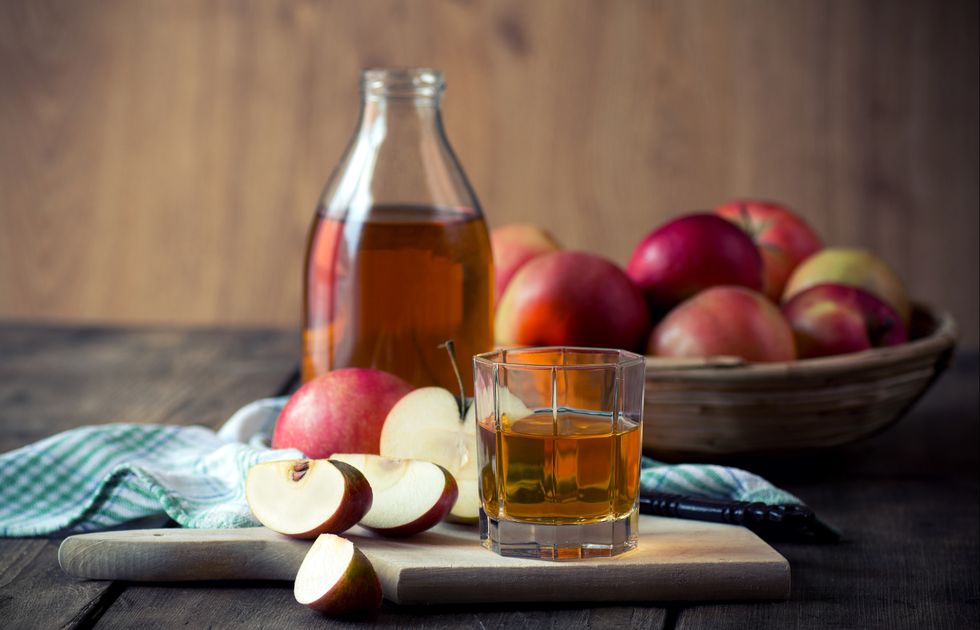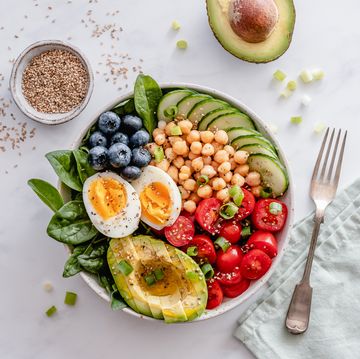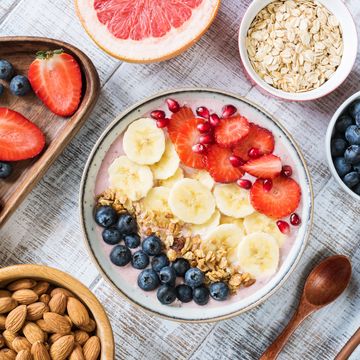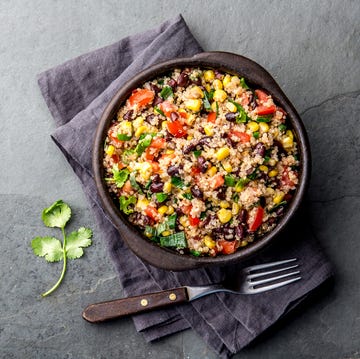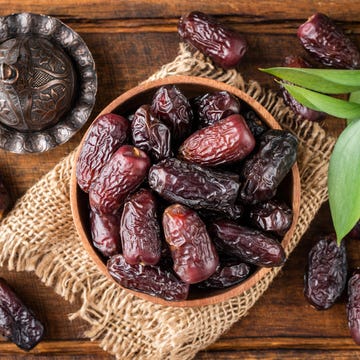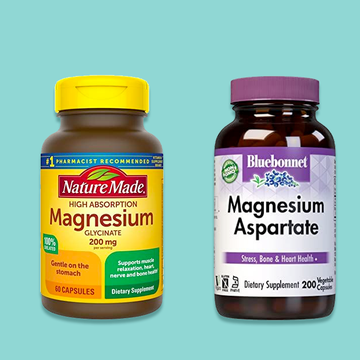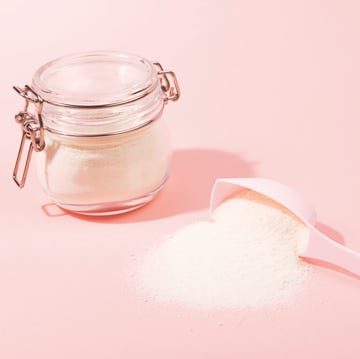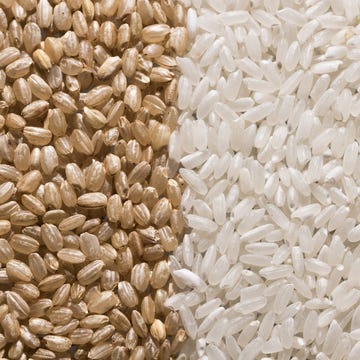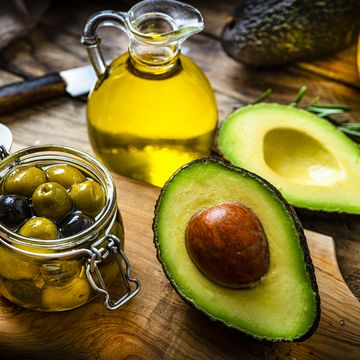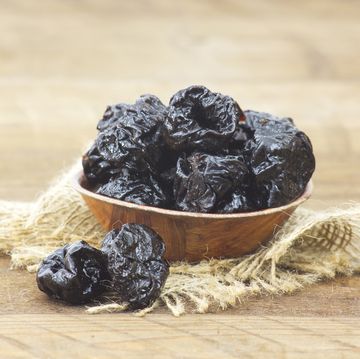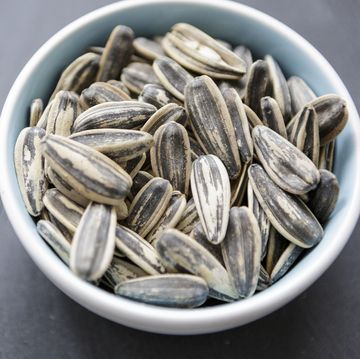You know what they say: An apple a day keeps the doctor away. The common expression dates all the way back to 1866 — and the Victorians weren’t that far off. Here’s why you should chow down on a McIntosh, Fuji, or Gala with your lunch today:
Nutrition Stats
Serving Size: 1 medium apple with peel, raw
- 125 calories
- 30 g carbohydrate (10% DV)
- 4.9 g dietary fiber (20% DV)
- 22 g sugars
- 0.6 g protein (1% DV)
- .053 mg riboflavin (3%DV)
- 116.6 IU vitamin A (2% DV)
- .072 mg vitamin B6 (4% DV)
- .51 mg vitamin E (2% DV)
- 5.5 ug vitamin K (7% DV)
- 10.6 mg magnesium (3% DV)
- 25.44 mg phosphorus (3% DV)
- 220.48 mg potassium (5% DV)
Health Benefits of Apples
Besides advantageous effects on blood sugar and inflammation, eating apples can also:
- Lower “bad” cholesterol: Procyanidins in apples (a type of flavonoid) have strong antioxidant activity and may lower low-density lipids (LDL or “bad” cholesterol).
- Help your heart: By reducing cholesterol, the high polyphenol content from frequent apple consumption could also lower your risk of cardiovascular disease.
- Safeguard your mind: The high levels of antioxidants in apples may protect against neurodegenerative diseases like Alzheimer's and Parkinson's and maintain brain performance.
- Promote healthy digestion: Apple polyphenols and fiber may also bolster the microbiome in your gut.
Ready to stock up on bushels of apples? Here’s everything you need to know about choosing and preparing apples, whether they’re fresh, dried, or in liquid form:
Do I need to worry about pesticides?
Pesticides are commonly used in apple production, so you may want to reach for the organic versions. Washing, boiling, peeling, coring, and juicing may also reduce some pesticide residue on apples. Remember that since infants and children are smaller than adults, pesticides may have a greater impact on their health.
Does the type of apple matter nutritionally?
The specific content of health-promoting polyphenols does vary by type (or cultivar) of apples, like Braeburn, Honeycrisp, Empire, or Golden Delicious. However, they're all a great source of powerful antioxidants.
What about red versus green?
Apples contain healthful nutrients regardless of their color. However, red apples have more anthocyanin, which may provide heart-healthy and cholesterol-lowering benefits. For instance, Red Delicious apples contain nearly five times as much anthocyanins as Granny Smiths. Red Delicious apples also have slightly more fiber, calcium, magnesium, phosphorus, potassium, and vitamin K. However, Granny Smith apples have been shown to contain slightly more vitamin A. Nevertheless, both are good choices for adding antioxidants and other nutrients to your diet.
Should I eat the peel?
Yes! Peeling the apple may remove important phenolics, as the skin contains significantly more than the flesh. Plus, it constitutes nearly 10% of the entire fruit’s weight.
Can I just drink apple juice?
Eating whole apples provides filling, health-promoting fiber (up to 5 grams per apple!) and plant-based antioxidants, which help support immune function. Apple juice on the other hand? Most are loaded sources of naturally occurring sugar (“apple juice concentrate”) plus water, making it higher in calories without keeping you satisfied. Plus, the processing that removes pulp and clarifies the juice also reduces the amount of antioxidants you actually get. Your best bet: Chomp on the whole fruit for a crunchy snack, and use fresh apple slices to add flavor to sparkling water.
Do dried apples provide any health benefits?
Yes! The fiber found in apples — including dried, unsweetened types — has been linked to lowering cholesterol levels, which can help reduce your risk of heart disease. Look for products that say “unsweetened” in the ingredients list and contain as few preservatives as possible to make sure you’re getting the most nutritious type of dried fruit.
What’s the deal with apple cider vinegar?
Made from the addition of bacterial cultures and yeast to apple juice, apple cider vinegar is a sweet-tasting fruit vinegar that gets some serious hype for reversing everything from diabetes to weight gain — if only it was that simple! The reality? If you love ACV so much that you're using it as a salad dressing or a means for eating more produce, then go for it! Vinegar is a zero-calorie way to enhance the flavor of many foods without much of a health risk, except for GERD sufferers.
But if you're solely drinking the stuff straight for its purported health "benefits," science says you're out of luck (at least for now). Your best bet is to fill up on plant-based foods like actual apples, which will provide all the benefits you need to stay healthy. Bottom line: Vinegar is for salads, not supplements.

A registered dietitian with a Bachelor of Arts degree from Northwestern University and a Master of Science degree in Clinical Nutrition from New York University, Jaclyn “Jackie” London handled all of Good Housekeeping’s nutrition-related content, testing, and evaluation from 2014 to 2019. Prior to joining GH, she was a clinical dietitian at Mount Sinai Hospital. Jackie has also appeared as an expert guest on The Dr. Oz Show and The Today Show. She is also author of the book Dressing on the Side (and Other Diet Myths Debunked).
